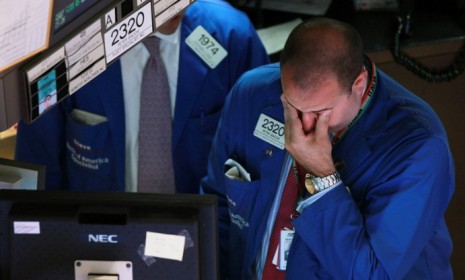You say 'recession,' I say 'depression'
With hopes for a quick recovery fading, the fight over what to call the economic slump begins anew

A free daily email with the biggest news stories of the day – and the best features from TheWeek.com
You are now subscribed
Your newsletter sign-up was successful
Economists warn that U.S. is facing slower economic growth ahead, raising fears that the nation may fall into another recession. But some financial experts say it makes perfect sense that business isn't bouncing back as it has after past recessions — because what we're experiencing is actually a full-blown depression, instead of a more common recession. Is this financial crisis a depression, or a recession? (Watch a CNBC discussion about whether this is a depression)
Sorry, folks. This is a depression: Unlike all the post-World War II recessions, this downturn was global in scale, says John B. Judis in The New Republic. And like the Great Depression, the current crisis was "precipitated, and deepened, by a financial crisis." Past experience shows that only massive government spending can speed the economy out of a depression — if we pull back, and treat this like a mere recession, we'll only prolong the pain.
"You say recession, I say depression"
The Week
Escape your echo chamber. Get the facts behind the news, plus analysis from multiple perspectives.

Sign up for The Week's Free Newsletters
From our morning news briefing to a weekly Good News Newsletter, get the best of The Week delivered directly to your inbox.
From our morning news briefing to a weekly Good News Newsletter, get the best of The Week delivered directly to your inbox.
Don't fall for the liberal word play: The U.S. economy has suffered a bad recession, says Howard Rich at Encore online. If we leave it to the free market, we'll bounce back quickly. But if Big Government advocates continue to use scare tactics to justify "costly federal interventionist policies." If they have their way, we'll turn "a recession into a depression" by overburdening the government with debt, just like we did after the crash of 1929.
It doesn't matter what we call it — the economy's in crisis: A recession is a downturn that's part of a normal business cycle, says Mondo Frazier at Death by 1000 Paper Cuts, while a depression is a long-term crisis that hits many countries at once. Whatever word you choose, we've got massive deficits, 10 percent unemployment, and no relief in sight. "We only have two words of advice: buckle up."
"Recovery summer's over. Now, is it a recession or depression?"
A free daily email with the biggest news stories of the day – and the best features from TheWeek.com
-
 The week’s best photos
The week’s best photosIn Pictures An Andean god, a rogue squirrel, and more
-
 ‘Zero trimester’ influencers believe a healthy pregnancy is a choice
‘Zero trimester’ influencers believe a healthy pregnancy is a choiceThe Explainer Is prepping during the preconception period the answer for hopeful couples?
-
 AI surgical tools might be injuring patients
AI surgical tools might be injuring patientsUnder the Radar More than 1,300 AI-assisted medical devices have FDA approval